"The three Caucasus nations (Armenia, Georgia and Azerbaijan) today are just the latest of scores of republics, kingdoms, principalities, emirates, khanates and satrapies (ancient Persian provinces) that have blossomed and died here down the centuries" (Lonely Planet Guide "Georgia, Armenia & Azerbaijan" 2008)
ANCIENT REFERENCES
The Greeks, Romans and Persians brought pagan faiths and philosophies to the Caucasus some 1,000 years before Christianity took hold. The Caucasus featured significantly in the legends of ancient Greece. Prometheus was chained on a Caucasian mountain, and Jason and his Argonauts sought the Golden Fleece at Colchis*.
*In Greco-Roman geography, Colchis was a region in the Southern Caucasus located on the eastern coast of the Black Sea, centered on present-day western Georgia.
Other sources cite that history began in the Caucasus at an unspecified time when Noah's Ark grounded on Mount Ararat, now included in the country of modern day Turkey.
TIMELINE SUMMARY OF KEY EVENTS
669-627 BC
The Assyrian Empire reaches as far as the Caucasus Mountains.
Assyria, a major Mesapotamian East Semitic kingdom and Empire of the Ancient Near East, existed as an independent state for a period of approximately six centuries from c. 1250 BC to 612 BC, spanning the Early Bronze Age through to the late Iron Age.
300- 400 BC
Zoroastrianism becomes the dominant religion of the region.
95-55 BC
Under the Armenian Tigranes the Great, the Kingdom of Armenia becomes an Empire, growing to include Iberia*, Albania, Parthia, Atropatene, Mesopotamia, Cappadocia, Cilicia, Syria, Nabataean kingdom and Judea.
*In Greek-Roman times, Iberia was the name for a kingdom of the Southern Caucasus centered on present-day Eastern Georgia. Around the first centuries BC and AD the land south of the Greater Caucasus and north of the Lesser Caucasus was divided between Colchis in the west, Caucasian Iberia in the center and Caucasian Albania in the east. To the southwest was Armenia and to the southeast Atropane. Iberia, also known in Georgian as Kartli, after its core province, was then a significant state in the Caucasus, either as an independent state or as a dependent of larger empires, notably the Sassanid and Roman Empires. Its population, known as the Roman Caucasian Iberian, formed the nucleus of the Georgians (Kartvelians), and the state, together with Colchis to its west, would form the nucleus of the medieval Kingdom of Georgia.
Note: The term Caucasian Iberia is used to distinguish it from the Iberian Peninsular in Western Europe.
66 BC
Rome seizes control of Armenia and Georgia.
301 AD
King Trdat III is converted to Christianity. Armenia becomes the first nation to adopt Christianity as a state religion. Later Caucasian Albania and Georgia become Christian entities.
7th - 8th CENTURY
The Arab invasion results in the partial introduction of Islam. Muslim conquest of Azerbaijan, Georgia and Armenia.
9th CENTURY
Local prince Ashot I of the Bagrati family becomes King of Armenia and forms the Bagratid Kingdom of Armenia. The Bagrati Kingdom then controls large areas of present day Turkey and Georgia.
10th CENTURY
The Caucasus region is overtaken by Persian lordship.
11th - 12th CENTURY
The Seljuk Turks, originating from Central Asia plunder and destroy much of the Caucasus region.
Georgian King David the Builder (1089-1125) drives the Seljuks out of Georgia, establishing its medieval Golden Age.
During 1194 - 1204, David's granddaughter Queen Tamar's armies crush new Seljuk invasions from the south. As a result of her military campaigns, Georgia becomes the strongest Christian state in the Near East region.
13th CENTURY
The Mongols invade from the east. Thousands die in the Black Death.
Later in the century a new enemy Tamerlane (Timur) from Central Asia conquers the region.
14th CENTURY
The Sirvan Khanate (now modern day Azerbaijan) gains autonomy and its capital Baku becomes a prosperous trade route centre.
16th - 17th CENTURY
Sirvan is conquered by the Azeris from (now) northern Iran.
Persian based Azeri Safavid dynasty battles with the Ottoman Turks over the Caucasus. The Ottomans take over all of Armenia and retain it for almost 400 years.
The Ottoman Empire becomes a powerful multinational, multilingual empire controlling much of south-east Europe, western Asia, the Caucasus, north Africa and the Horn of Africa.
18th CENTURY
Formation of the Russian Empire, one of the largest empires in the world. By the 19th century, the empire extended from the Arctic Ocean in the north to the Black Sea on the South and the Baltic Sea on the west to the Pacific Ocean, and (until 1867) into Alaska and North America in the east.
19th CENTURY
The 1817-1864 Caucasian War. Invasion of the Caucasus by the Russian Empire results in the annexation of areas of the northern Caucasus and "ethnic cleansing" of the native Circassian peoples. A series of military actions is waged by Russia against territories and tribal groups in Chechnya, Dagestan, Abkhaz, Abazins and Ubykh.
As a result of the Russian wars with Persia, Georgia, southern Dagestan, Armenia and Azerbaijan are incorporated into the Russian Empire.
20th - 21th CENTURY
World War 1. The 1917 Russian Revolution and collapse of the Russian Empire.
1918
Formation of the Transcaucasian Socialist Federative Soviet Republic, embraces independent Armenia, Azerbaijan and Georgia (known as the Transcaucasian Republics). The short term independence last only months before being dissolved.
1942
During World War II - the Battle of the Caucasus. In the summer of 1942, German and German-allied forces launches an offensive at the Volga and Caucasus regions in an attempt to secure the industrially active and resource-rich Transcaucasian region. The German Sixth Army is tasked with seizing the city of Stalingrad which develops into a major battle due to tenacious Soviet resistance and a major Soviet counter-attack. The decisive German defeat at Stalingrad is a major turning point in the Second World War, with the German troops in the Caucasus forced to retreat.
Late 1980's
Nagorno-Karabakh War. Bloody conflict arises between the majority Armenians within the Nagorno-Karabakh enclave (backed by Armenia) and the Azeris (backed by Azerbaijan). By 1994, the Armenians are in full control over most of the enclave. Today, Nagorno-Karabakh is internationally recognized as part of Azerbaijan, but most of the region is governed by the Nagorno-Karabakh Republic, a de facto independent but unrecognised state. Azerbaijan has not exercised political authority over the region since the advent of the Karabakh Movement in 1988.
1991
Russian Soviet Union collapses. Armenia, Georgia and Azerbaijan (as well as Central Asian and other countries) are declared independent states.
1992 - 1993
In 1992 Armenia joins the United Nations. A trade and energy embargo is imposed by Azerbaijan. The conflict over Nagorno-Karabakh continues.
In Georgia, a war breaks out in Abkhazia between Georgian forces and the Abkhaz separatist forces supporting independence of Abkhazia from Georgia. Separatists are supported by Russian forces.
Conflict in Georgia with separatists in Georgian South Ossetia who wish to re-unite with North Ossetia in Russia.
1995
Eduard Shevardnadze wins elections to become President of Georgia.
1994- 1996
Azerbaijan signs what it calls the "contract of the century" with a consortium of international oil companies for the exploration and exploitation of three offshore oil fields.
First Chechen war, a bloody ruthless conflict over independence between Russia and the Islamic Chechen Republic of Ichkeria. Russia suffers a humiliating defeat and Chechnya becomes what was widely known as Russia's Vietnam.
1999
In Armenia, gunmen open fire in the Armenian parliament. The prime minister, parliamentary speaker and six other officials are killed.
Second Chechen War launched by the Russian Federation in response to the invasion of Dagestan by the Islamic International Brigade. The second war was declared a victory for Russia only in 2009
2001
Azerbaijan becomes full member of Council of Europe, though council officials criticise it over human rights record.
US lifts aid ban in Azerbaijan, imposed during Nagorno-Karabakh conflict, after Azerbaijan provides airspace and intelligence after 11 September al-Qaeda attacks in US.
Azerbaijan, Georgia and Turkey reach agreement on oil and gas pipelines linking Caspian fields with Turkey.
2003-2004
"Rose Revolution" in Georgia topples President Shevardnadze.
2006
Conflict again in Abkhazia and Russians expel hundreds of Abkhazian Georgians.
Explosions on Russian side of the Georgian border cuts gas supplies and disrupts electricity supplies from Russia for both Georgia and Armenia.
Azerbajian - Georgia - Turkey oil pipeline formally opened, piping oil from the Caspian Sea in Azerbajian.
2008
In August 2008, Georgia tries to re-take South Ossetia by force resulting in the South Ossetia War. Russia launches swift counter attack ejecting troops from both South Ossetia and Abkhazia.
2014
Deadly clashes between troops from Azerbaijan and Armenia over the disputed enclave of Nagorno-Karabakh.
2015
In March Russia signs an "alliance and integration" treaty with South Ossetia. Georgian government denounces move as Russia taking step closer to annexing territory.
In August, Russian forces in South Ossetia move internal border 1.5 km further inside Georgia proper, threatening main road linking west and east of country.
2016
April 2016, fighting breaks out once again between Armenia and Azerbaijan over the disputed enclave of Nagorno-Karabakh. AlJazeera media sources report the outbreak of hostilities is the worst since the war that ended in 1994, leaving Nagorno-Karabakh under the
control of local ethnic Armenian forces and the Armenian military.
The Caucasus - A Historic Timelime Summary
Sunday, May 17, 2015
 Yerevan, Armenia
Yerevan, Armenia
Other Entries
-
1The Inspiration: But Where are the Caucasus?
May 089 days prior Crowdy Head, Australiaphoto_camera4videocam 0comment 0
Crowdy Head, Australiaphoto_camera4videocam 0comment 0 -
2Crowdy to Sydney - Save Us From a Bus Tour....
May 089 days prior Sydney, Australiaphoto_camera11videocam 0comment 0
Sydney, Australiaphoto_camera11videocam 0comment 0 -
3To Shanghai - When a Snake Meets A Tiger
May 098 days prior Shanghai, Chinaphoto_camera13videocam 0comment 0
Shanghai, Chinaphoto_camera13videocam 0comment 0 -
4To Moscow - Two Contrasting Faces of Russia
May 107 days prior Moscow, Russian Federationphoto_camera5videocam 0comment 0
Moscow, Russian Federationphoto_camera5videocam 0comment 0 -
5Russian History Time Line Summary
May 107 days prior Moscow, Russian Federationphoto_camera9videocam 0comment 0
Moscow, Russian Federationphoto_camera9videocam 0comment 0 -
6A Walk with Svetlana - Absorbing Moscow City
May 116 days prior Moscow, Russian Federationphoto_camera42videocam 0comment 0
Moscow, Russian Federationphoto_camera42videocam 0comment 0 -
7We Get Hopelessly Lost in Moscow...
May 125 days prior Moscow, Russian Federationphoto_camera13videocam 0comment 0
Moscow, Russian Federationphoto_camera13videocam 0comment 0 -
8Aboard the Sapsan: From Moscow to St Petersburg
May 134 days prior St. Petersburg, Russian Federationphoto_camera18videocam 0comment 0
St. Petersburg, Russian Federationphoto_camera18videocam 0comment 0 -
9A Walk With Nadya: Absorbing St Petersburg
May 143 days prior St Petersburg, Russian Federationphoto_camera34videocam 0comment 1
St Petersburg, Russian Federationphoto_camera34videocam 0comment 1 -
10State Hermitage Museum & Adventures in St Petes
May 152 days prior St. Petersburg, Russian Federationphoto_camera22videocam 0comment 1
St. Petersburg, Russian Federationphoto_camera22videocam 0comment 1 -
11Once We Had No Armenian Visas - Now We Have Four..
May 161 day prior Yerevan, Armeniaphoto_camera5videocam 0comment 0
Yerevan, Armeniaphoto_camera5videocam 0comment 0 -
12The Caucausus - An Uncomfortable Dinner Party
May 17earlier that day Yerevan, Armeniaphoto_camera4videocam 0comment 2
Yerevan, Armeniaphoto_camera4videocam 0comment 2 -
13The Caucasus - A Historic Timelime Summary
May 17 Yerevan, Armeniaphoto_camera8videocam 0comment 0
Yerevan, Armeniaphoto_camera8videocam 0comment 0 -
14Armenia: Proud People of a Lost Land
May 17later that day Yerevan, Armeniaphoto_camera25videocam 0comment 0
Yerevan, Armeniaphoto_camera25videocam 0comment 0 -
15Under the Gaze of Noah
May 181 day later Yerevan, Armeniaphoto_camera36videocam 0comment 2
Yerevan, Armeniaphoto_camera36videocam 0comment 2 -
16Lake Sevan - The Tranquility and The Terror
May 192 days later Gyumri, Armeniaphoto_camera36videocam 0comment 0
Gyumri, Armeniaphoto_camera36videocam 0comment 0 -
17Gyumri: God Will Heal Your Wounded Soil
May 203 days later Bavra, Armeniaphoto_camera18videocam 0comment 0
Bavra, Armeniaphoto_camera18videocam 0comment 0 -
18Keti, Vano & Welcome to Georgian Hospitality....
May 203 days later Akhaltsikhe, Georgiaphoto_camera19videocam 0comment 0
Akhaltsikhe, Georgiaphoto_camera19videocam 0comment 0 -
19To Borjomi - Playground of the Tsars
May 214 days later Batumi, Georgiaphoto_camera25videocam 0comment 1
Batumi, Georgiaphoto_camera25videocam 0comment 1 -
20Batumi to Zugdidi - Mestia: Guests of the Dadianis
May 225 days later Mestia, Georgiaphoto_camera27videocam 0comment 3
Mestia, Georgiaphoto_camera27videocam 0comment 3 -
21Silent Witnesses of a Strange Place
May 225 days later Ushguli, Georgiaphoto_camera46videocam 0comment 0
Ushguli, Georgiaphoto_camera46videocam 0comment 0 -
22Kutaisi: "This is My Abode Forever and Ever..."
May 247 days later Kutaisi, Georgiaphoto_camera26videocam 0comment 0
Kutaisi, Georgiaphoto_camera26videocam 0comment 0 -
23To Gori: Birth Place of Joseph Stalin
May 258 days later Gori, Georgiaphoto_camera25videocam 0comment 0
Gori, Georgiaphoto_camera25videocam 0comment 0 -
24Gori to Tbilisi: Travelling Through Troubled Lands
May 258 days later Tblisi, Georgiaphoto_camera27videocam 0comment 0
Tblisi, Georgiaphoto_camera27videocam 0comment 0 -
25In the Presense of St Nino & Vano's Perfect Picnic
May 269 days later Tbilisi, Georgiaphoto_camera19videocam 0comment 0
Tbilisi, Georgiaphoto_camera19videocam 0comment 0 -
26In Fields of Gold: Davit Gareja Monastery Complex
May 2710 days later Davit Gareja, Georgiaphoto_camera21videocam 0comment 0
Davit Gareja, Georgiaphoto_camera21videocam 0comment 0 -
27Bodbe Monastry: Resting Place of St Nino
May 2811 days later Sighnaghi, Georgiaphoto_camera18videocam 0comment 0
Sighnaghi, Georgiaphoto_camera18videocam 0comment 0 -
28From Georgia Into Azerbaijan - "Good Luck"!
May 2811 days later Sheki, Azerbaijanphoto_camera26videocam 0comment 0
Sheki, Azerbaijanphoto_camera26videocam 0comment 0 -
29Azerbaijan - A Very Well Kept Secret....
May 2811 days later Sheki, Azerbaijanphoto_camera24videocam 0comment 4
Sheki, Azerbaijanphoto_camera24videocam 0comment 4 -
30Along the Dagestan Border to Ancient Lahij Village
May 2912 days later Lahıj, Azerbaijanphoto_camera49videocam 0comment 0
Lahıj, Azerbaijanphoto_camera49videocam 0comment 0 -
31Baku - One of the Beautiful Cities of the World
May 3013 days later Baku, Azerbaijanphoto_camera60videocam 0comment 0
Baku, Azerbaijanphoto_camera60videocam 0comment 0

 Yerevan, Armenia
Yerevan, Armenia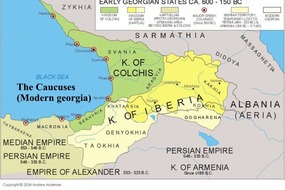
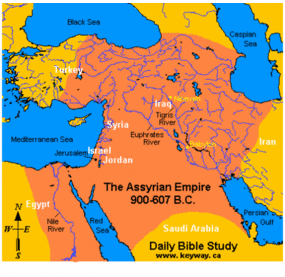
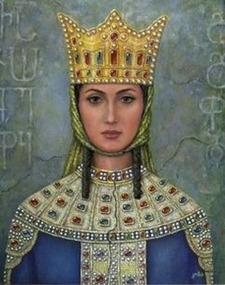
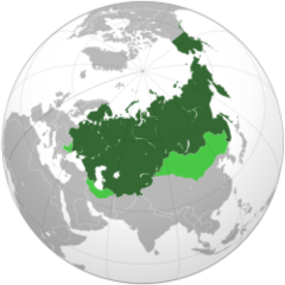
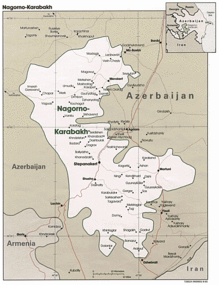
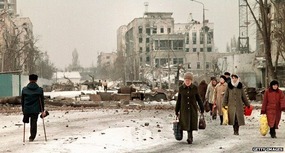
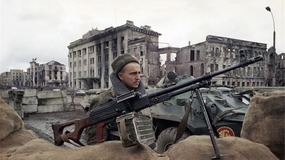
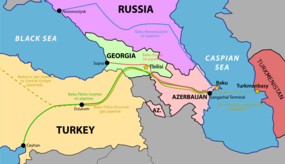






2025-05-22